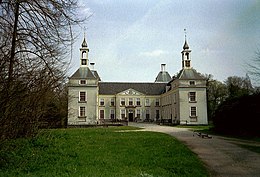
A heerlijkheid (a Dutch word; pl. heerlijkheden; also called heerschap; Latin: Dominium)[1] was a landed estate that served as the lowest administrative and judicial unit in rural areas in the Dutch-speaking Low Countries before 1800. It originated as a unit of lordship under the feudal system during the Middle Ages. The English equivalents are manor, seigniory and lordship.[2] The German equivalent is Herrschaft. The heerlijkheid system was the Dutch version of manorialism that prevailed in the Low Countries and was the precursor to the modern municipality system in the Netherlands and Flemish Belgium.[3][4]
- ^ Brabantia illustrata
- ^ Van Dale. Groot Woordenboek Nederlands Engels.. The translation used by J.L. Price in Dutch Society 1588-1713 is "manor"; by David Nicholas in Medieval Flanders is "seigneury".
- ^ The unreferrenced information in this article has been translated from the mostly unfootnoted article on "heerlijkheid" on the Dutch version of Wikipedia.
- ^ Much of the unreferrenced information in this article is found at this website: Heerlijkheden van Holland (in Dutch only)